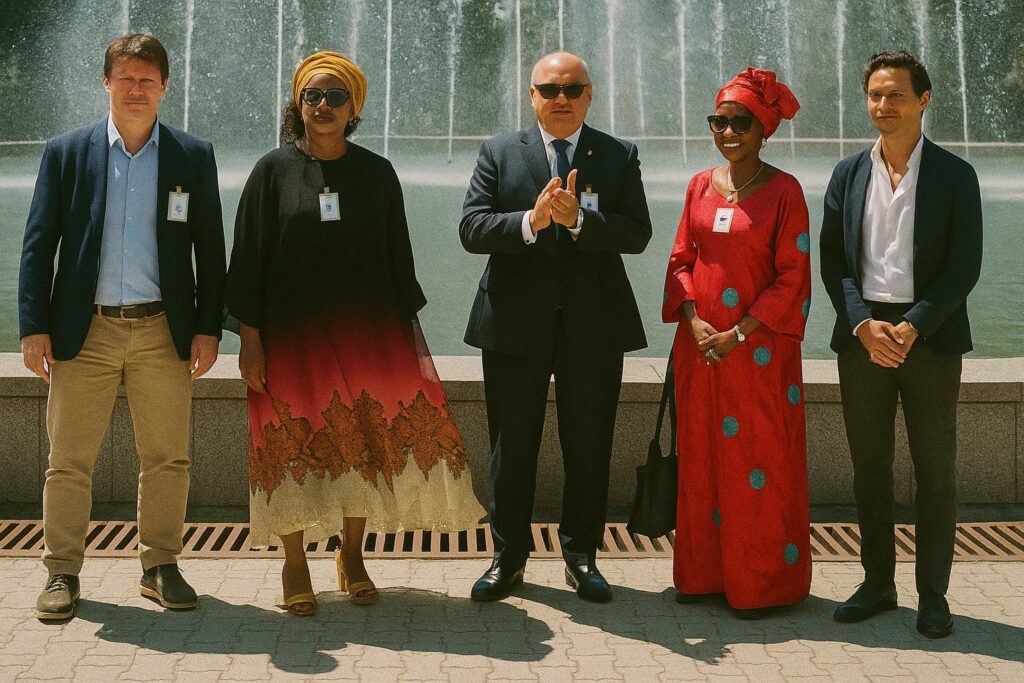Congo’s Special Economic Zones as Laboratories of Diversification
Since President Denis Sassou-Nguesso promulgated Law 33-2018 on Special Economic Zones, Brazzaville has portrayed these enclaves as catalysts for a post-oil economy. Oyo-Ollombo, strategically located in the forest-rich Cuvette Department, has long been earmarked for an agro-forestry tilt, yet previous memoranda struggled to survive the feasibility stage. The June signing in Vienna rejuvenates that narrative, positioning the zone as a showcase where natural-capital accounting meets industrial policy.
Vienna Signing Ceremony and the Architecture of the Deal
On 23 June, Ministers Jean-Marc Thystère-Tchicaya and Rosalie Matondo initialled a memorandum with Karl Ernst Kirchmayer, chief executive of ASC-Impact, under the discreet patronage of Congolese ambassador Edith Itoua. According to officials, the Austrian firm will mobilise an initial €100 million for large-scale reforestation, followed by ‘several hundred thousand euros’ for downstream sawmilling, veneer rolling and pulp production. While the figures remain indicative, Vienna-based diplomats underscore that the agreement commits both parties to a joint venture structure in which ASC-Impact holds operational control, whereas the Congolese state retains land ownership and regulatory oversight (Austrian MFA briefing, 2024).
Financial Commitments and the Elusive Arithmetic of Carbon Markets
Brazzaville hopes the project will generate verified forest carbon credits under Article 6 of the Paris Agreement, echoing neighbouring Gabon’s attempt to monetise avoided deforestation (UNFCCC data, 2022). Yet market volatility is tangible: voluntary credit prices slid nearly 40 percent last year (BloombergNEF, 2023). ASC-Impact contends that its mix of afforestation and industrial value-addition will produce ‘premium credits’, pegged to EU taxonomy criteria, thus cushioning price swings. Skeptics recall that the Central African Forest Initiative warned of “data paucity and monitoring fatigue” across the basin (CAFI report, 2022). The ministries therefore pledge to install a remote-sensing unit within the SEZ to audit biomass gains, an important gesture after Congo’s 2020 Forestry Code tightened traceability obligations.
Local Employment, Industrial Transformation and Governance Challenges
Official communiqués predict the creation of ‘several thousand’ direct and indirect jobs. Economists in Brazzaville temper such optimism, noting that previous logging concessions rarely converted sawlogs into higher-value products locally, partly due to erratic power supply. The new pact envisages a 25-megawatt biomass cogeneration plant, fuelled by residues, to stabilise electricity. Civil-society groups, including the Observatoire Congolais des Droits de l’Homme, warn that benefit-sharing must reach communities accustomed to customary tenure. Minister Matondo insists that revenue from carbon certificates will be funnelled into a local development fund, echoing provisions in the 2022 implementing decree on forest concessions.
Regional Climate Diplomacy and the EU Green Imperative
Vienna’s role is hardly coincidental. Austria is positioning itself as a niche broker between Central Africa and European capital markets hungry for ‘nature-based assets’. Former Austrian president Heinz Fischer, now co-chair of the Ban Ki-Moon Centre, called the deal “an embryonic example of climate multilateralism that must scale responsibly”. The timing overlaps with the EU’s new Regulation on Deforestation-Free Products, a measure that could bar unsustainably sourced timber from European shelves. By aligning Oyo-Ollombo operations with Forest Stewardship Council standards from inception, ASC-Impact hopes to future-proof exports and burnish European compliance credentials.
Assessing the Road Ahead for Oyo-Ollombo and Central African Forests
Implementation risks are conspicuous. Congo ranks 164th in the World Bank’s business-environment index, and its debt-to-GDP ratio hovers around 80 percent (World Bank, 2023). A senior official in the Finance Ministry, speaking on background, concedes that “meeting sovereign guarantees without mortgaging future oil revenue will require fiscal creativity.” Nevertheless, stakeholders draw encouragement from Brazzaville’s recent admission to the African Trade Insurance Agency, which could provide political-risk cover for ASC-Impact lenders. Ultimately, the pact will be judged less by Vienna photo-ops than by stump counts, employment ledgers and transparent carbon-credit registries. If the numbers align, Oyo-Ollombo may evolve into a template for reconciling Central Africa’s forestry endowment with the exigencies of a decarbonising world.

